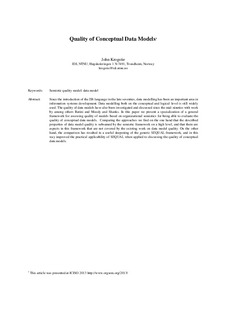| dc.contributor.author | Krogstie, John | |
| dc.date.accessioned | 2013-04-21T20:38:52Z | |
| dc.date.accessioned | 2016-06-22T08:51:29Z | |
| dc.date.available | 2013-04-21T20:38:52Z | |
| dc.date.available | 2016-06-22T08:51:29Z | |
| dc.date.issued | 2013 | |
| dc.identifier.citation | Liu, Kecheng; Li, Weizi; Gulliver, Stephen [Eds.] ICISO 2013 Proceedings p. 165-174, SciTePress, 2013 | nb_NO |
| dc.identifier.isbn | 978-989-8565-51-8 | |
| dc.identifier.uri | http://hdl.handle.net/11250/2393533 | |
| dc.description.abstract | Since the introduction of the ER-language in the late seventies, data modelling has been an important area in information systems development. Data modelling both on the conceptual and logical level is still widely used. The quality of data models have also been investigated and discussed since the mid-nineties with work by among others Batini and Moody and Shanks. In this paper we present a specialization of a general framework for assessing quality of models based on organizational semiotics for being able to evaluate the quality of conceptual data models. Comparing the approaches we find on the one hand that the described properties of data model quality is subsumed by the semiotic framework on a high level, and that there are aspects in this framework that are not covered by the existing work on data model quality. On the other hand, the comparison has resulted in a useful deepening of the generic SEQUAL-framework, and in this way improved the practical applicability of SEQUAL when applied to discussing the quality of conceptual data models. | nb_NO |
| dc.language.iso | eng | nb_NO |
| dc.publisher | SciTePress | nb_NO |
| dc.title | Quality of Conceptual Data Models | nb_NO |
| dc.type | Chapter | nb_NO |
| dc.date.updated | 2013-04-21T20:38:52Z | |
| dc.description.version | submittedVersion | |
| dc.identifier.cristin | 1024804 | |
